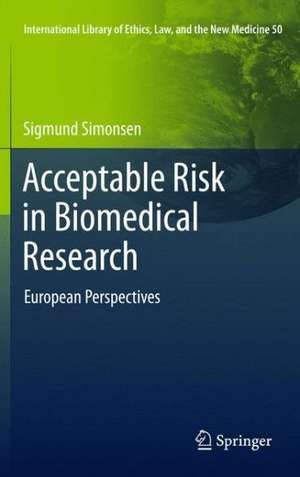Acceptable Risk in Biomedical Research: European Perspectives: International Library of Ethics, Law, and the New Medicine, cartea 50
Autor Sigmund Simonsenen Limba Engleză Paperback – 22 feb 2014
This investigation addresses research on healthy volunteers, children, vulnerable subjects, and includes placebo controlled clinical trials. It represents a major contribution towards clarifying the most central, but also the most controversial and complex issue in biomedical research law and bioethics. The EU Clinical Trial Directive, the Council of Europe’s Oviedo Convention (and its Additional Protocol), and national regulation in member states are covered. It is a relevant work for lawyers and ethicists, and the practical approach makes a valuable tool for researchers and members of research ethics committees supervising biomedical research.
| Toate formatele și edițiile | Preț | Express |
|---|---|---|
| Paperback (1) | 640.37 lei 6-8 săpt. | |
| SPRINGER NETHERLANDS – 22 feb 2014 | 640.37 lei 6-8 săpt. | |
| Hardback (1) | 645.79 lei 6-8 săpt. | |
| SPRINGER NETHERLANDS – 5 ian 2012 | 645.79 lei 6-8 săpt. |
Din seria International Library of Ethics, Law, and the New Medicine
- 5%
 Preț: 347.30 lei
Preț: 347.30 lei -
 Preț: 397.26 lei
Preț: 397.26 lei - 15%
 Preț: 635.31 lei
Preț: 635.31 lei - 18%
 Preț: 942.76 lei
Preț: 942.76 lei - 5%
 Preț: 718.65 lei
Preț: 718.65 lei - 15%
 Preț: 634.68 lei
Preț: 634.68 lei - 15%
 Preț: 637.78 lei
Preț: 637.78 lei -
 Preț: 380.07 lei
Preț: 380.07 lei - 18%
 Preț: 959.98 lei
Preț: 959.98 lei - 15%
 Preț: 641.20 lei
Preț: 641.20 lei - 18%
 Preț: 944.19 lei
Preț: 944.19 lei - 15%
 Preț: 636.80 lei
Preț: 636.80 lei - 15%
 Preț: 643.00 lei
Preț: 643.00 lei - 18%
 Preț: 952.89 lei
Preț: 952.89 lei - 15%
 Preț: 643.48 lei
Preț: 643.48 lei - 18%
 Preț: 954.45 lei
Preț: 954.45 lei - 5%
 Preț: 1095.73 lei
Preț: 1095.73 lei - 15%
 Preț: 645.79 lei
Preț: 645.79 lei - 18%
 Preț: 1111.22 lei
Preț: 1111.22 lei - 15%
 Preț: 643.84 lei
Preț: 643.84 lei - 18%
 Preț: 1227.67 lei
Preț: 1227.67 lei - 18%
 Preț: 953.65 lei
Preț: 953.65 lei - 15%
 Preț: 638.57 lei
Preț: 638.57 lei - 5%
 Preț: 1101.21 lei
Preț: 1101.21 lei
Preț: 640.37 lei
Preț vechi: 753.39 lei
-15% Nou
Puncte Express: 961
Preț estimativ în valută:
122.55€ • 127.47$ • 101.17£
122.55€ • 127.47$ • 101.17£
Carte tipărită la comandă
Livrare economică 15-29 aprilie
Preluare comenzi: 021 569.72.76
Specificații
ISBN-13: 9789400795532
ISBN-10: 940079553X
Pagini: 312
Ilustrații: XVI, 296 p.
Dimensiuni: 155 x 235 x 16 mm
Greutate: 0.42 kg
Ediția:2012
Editura: SPRINGER NETHERLANDS
Colecția Springer
Seria International Library of Ethics, Law, and the New Medicine
Locul publicării:Dordrecht, Netherlands
ISBN-10: 940079553X
Pagini: 312
Ilustrații: XVI, 296 p.
Dimensiuni: 155 x 235 x 16 mm
Greutate: 0.42 kg
Ediția:2012
Editura: SPRINGER NETHERLANDS
Colecția Springer
Seria International Library of Ethics, Law, and the New Medicine
Locul publicării:Dordrecht, Netherlands
Public țintă
ResearchCuprins
1. Introduction.-
2. Method and material.-
3. Initial conceptual clarifications.-
4. Origins of the requirement of proportionality.-
5. The purpose of the requirement of proportionality.-
6. Introduction: Part II .-
7. Which risks, burdens and potential benefits are relevant?.-
8. How to estimate risks, burdens, and potential benefits.-
9. The requirement of proportionality – initial clarifications.-
10. Therapeutic research.-
11. Nontherapeutic research.-
12. Nontherapeutic research on “vulnerable” participants.-
13. Non-interference with necessary clinical interventions and the no harm rule.-
14. Especially on randomised clinical trials, including placebo controlled clinical trials.- 15. Acceptable Risks and Burdens to Others than the Participant.-
16. Later developments during the course of the research.-
17. Legal effects of the requirement of proportionality.-
18. Summary of results.-
19. Recommendations.-
20. Perspectives.-
21. Appendix.-.
2. Method and material.-
3. Initial conceptual clarifications.-
4. Origins of the requirement of proportionality.-
5. The purpose of the requirement of proportionality.-
6. Introduction: Part II .-
7. Which risks, burdens and potential benefits are relevant?.-
8. How to estimate risks, burdens, and potential benefits.-
9. The requirement of proportionality – initial clarifications.-
10. Therapeutic research.-
11. Nontherapeutic research.-
12. Nontherapeutic research on “vulnerable” participants.-
13. Non-interference with necessary clinical interventions and the no harm rule.-
14. Especially on randomised clinical trials, including placebo controlled clinical trials.- 15. Acceptable Risks and Burdens to Others than the Participant.-
16. Later developments during the course of the research.-
17. Legal effects of the requirement of proportionality.-
18. Summary of results.-
19. Recommendations.-
20. Perspectives.-
21. Appendix.-.
Textul de pe ultima copertă
This book is the first major work that addresses a core question in biomedical research: the question of acceptable risk. The acceptable level of risks is regulated by the requirement of proportionality in biomedical research law, which state that the risk and burden to the participant must be in proportion to potential benefits to the participant, society or science.
This investigation addresses research on healthy volunteers, children, vulnerable subjects, and includes placebo controlled clinical trials. It represents a major contribution towards clarifying the most central, but also the most controversial and complex issue in biomedical research law and bioethics. The EU Clinical Trial Directive, the Council of Europe’s Oviedo Convention (and its Additional Protocol), and national regulation in member states are covered. It is a relevant work for lawyers and ethicists, and the practical approach makes a valuable tool for researchers and members of research ethics committees supervising biomedical research.
This investigation addresses research on healthy volunteers, children, vulnerable subjects, and includes placebo controlled clinical trials. It represents a major contribution towards clarifying the most central, but also the most controversial and complex issue in biomedical research law and bioethics. The EU Clinical Trial Directive, the Council of Europe’s Oviedo Convention (and its Additional Protocol), and national regulation in member states are covered. It is a relevant work for lawyers and ethicists, and the practical approach makes a valuable tool for researchers and members of research ethics committees supervising biomedical research.
Caracteristici
First major (indepth) publication in European biomedical research law Elaborates on and clarifies the main legal and ethical theme in the assessments of biomedical research projects Practical approach (applied legal research) – describes how what the law says with the use of practical case examples

















